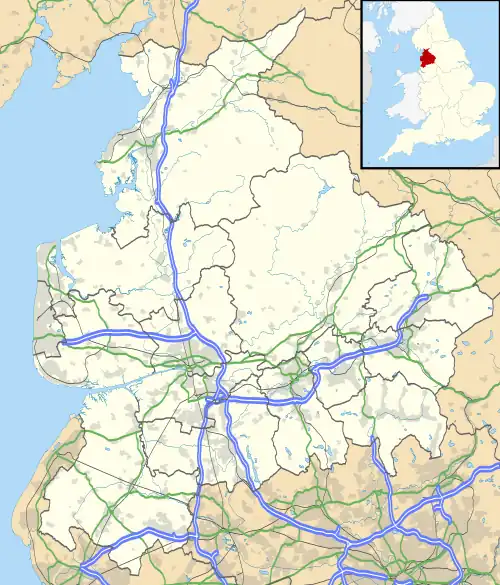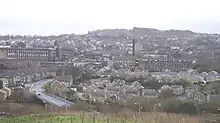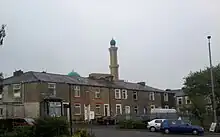| Brierfield | |
|---|---|
 Burnley Road, Brierfield | |
 Brierfield Shown within Pendle Borough  Brierfield Location within Lancashire | |
| Population | 8,193 (2011) [1] |
| OS grid reference | SD850361 |
| Civil parish |
|
| District | |
| Shire county | |
| Region | |
| Country | England |
| Sovereign state | United Kingdom |
| Post town | NELSON |
| Postcode district | BB9 |
| Dialling code | 01282 |
| Police | Lancashire |
| Fire | Lancashire |
| Ambulance | North West |
| UK Parliament | |
Brierfield (/ˌbraɪ.ərˈfiːld/) is a town and civil parish in the Borough of Pendle, in Lancashire, England. It is 3 miles (4.8 km) north east of Burnley, 1 mile (1.6 km) south west of Nelson, and 1 mile (1.6 km) north east of Reedley. The parish had a population of 8,193, at the census of 2011.[1]
The parish adjoins the Pendle parishes of Reedley Hallows, Old Laund Booth and Nelson, the Burnley parish of Briercliffe, and the unparished area of the town of Burnley.
History
The building of the Leeds and Liverpool Canal, the Blackburn to Addingham turnpike road, and the railway from Preston to Colne, led to the town developing during the 19th century.

Before the new transport links were constructed, the town was just a scattering of farmhouses forming part of Marsden township known as Little Marsden, which also covered a large part of what was to become Nelson. The land here was considered part of the manor of Ightenhill.[2] The village of Marsden was centred on St Paul's Church just over the boundary with Nelson.[3] Brierfield was likely one of Marsden's town fields,[4] along presumably with Limefield and Mansfield, located within Brierfield parish, and Scholefield and others in Nelson.[3] The older roads in the area connected Marsden with Burnley (Walverden Road), and Haggate (Halifax Road). A branch from latter at Marsden Heights (King's Causeway) descends the valley to cross Pendle Water into Pendle Forest. Chamber Hill next to the river here, was the site of an ancient property known as 'Chamber in Pendle', which belonged to the Radcliffe family of Winmarleigh and descended to Sir Gilbert Gerard in the late-16th century.[2][3]
Considered part of the Burnley Coalfield, it is thought that coal was being mined in the vicinity in the early-17th century. Marsden Colliery, also known as Brierfield Pit, off Lob Lane (now Clitheroe Road) close to the canal, was begun around 1811 by the Executors of John Hargreaves company. It was the first colliery in the area to use endless chain haulage powered by a stationary steam engine which would be widely adopted during the 19th century. As Marsden was nearing the end of its reserves in 1872 an explosion in a disused section killed two men and caused an underground fire. Operations were wound down and the pit closed early in 1873.[5][3]
The Ecroyd family of Edge End constructed Lomeshaye Mill as a water-powered worsted spinning mill on Pendle Water in 1780.[6] And Jewel Mill over the river in Reedley Hallows is also thought to have been started, also for worsted production, at around the same time.[7]
In 1838 the area's first cotton mill was constructed for Henry Tunstill on the east bank of the canal, next to the coal mine, and powered by a steam engine. After Henry's death in 1854, his sons formed Tunstill Brothers, and proceeded to erect a new six-story spinning mill at the site. Two further, adjoining four-storey buildings were added in 1868 and 1873 and the old mill demolished. Additional weaving shed space was added at the south end of the mill in 1876 and 1906. The last member of the family to run Brierfield Mills was Harry Tunstill who was involved in many other companies and was released as a director in 1928. The company was listed in a directory for 1948 and accredited with 79,284 mule spindles, 13,100 ring spindles, and 2800 looms, but failed in 1956. Smith & Nephew took over the mill for the production of surgical bandages in 1957.[8]
New mills were established along the banks of the canal and people flocked to the area to work in the cotton industry, many coming from the lead mining areas of the North Riding of Yorkshire as the lead seams were worked out. The cotton industry continued to be the main employer, until well into the 1960s, and in October 2006 that BSN (formerly Smith & Nephew) ceased production of woven cloth, at Brierfield Mills. After years of disuse, Pendle Council purchased the mills in March 2012, intending to use it as the flagship regeneration project.[9][10]
The town's war memorial features a large roaring bronze lion.[11] The town is known for its part in the movement of the Quaker. A meeting house is still in use on the south eastern boundary of the town,[12] and the bridge over Pendle Water at the foot of the town is called Quaker Bridge.[2]
The town's small cinema, Unit Four, closed down on 3 July 1997. It was showing Batman & Robin, The Fifth Element, Con Air, and Beavis and Butt-Head Do America.[13] The last film shown was Con Air, that day at 8.20pm. One reason it closed down was due to the opening of the new cinema in Burnley, Hollywood Park, which opened one month prior.[14] It was later replaced by the branch of Dixy Chicken, as well as Maria's World Food Store.[15]

Governance
Brierfield was once part of the area of Marsden township known as Little Marsden in the ancient parish of Whalley, which became a civil parish in 1866.[16] The area around Brierfield was made an urban district in 1894.[17]
In 1974, under the Local Government Act 1972, Brierfield became part of the Borough of Pendle. Initially Brierfield formed part of an unparished area, in 1992 a new civil parish was created covering a similar but smaller area than the old urban district.[18][17]
After boundary changes in 2020 which reduced the number of wards in the borough to 12, two cover parts of Brierfield parish – Brierfield East & Clover Hill and Brierfield West & Reedley.[19][20] The town is represented on Lancashire County Council in two divisions: Brierfield & Nelson West and Pendle Hill.[21]
The Member of Parliament for Pendle, the constituency into which the town falls, is Andrew Stephenson (Conservative), who was first elected in 2010.
Demography


The United Kingdom Census 2011 showed a total resident population for Brierfield civil parish of 8,193.[1] a marginal reduction from 8,199 in 2001.[22] The town forms part of a wider urban area, which had a population of 149,796 in 2001, with 10,047 in a Brierfield subdivision .[23] A similar but larger, Burnley Built-up area defined in the 2011 census had a population of 149,422.[24]
The racial composition of the town in 2011 was 60.2% White (58.9% White British), 38.0% Asian, 0.4% Black, 0.2% Mixed and 1.2% Other. The largest religious groups were Christian (44.4%) and Muslim (36.2%). 59.5% of adults between the ages of 16 and 74 were classed as economically active and in work.[1]
| Year | 1901 | 1911 | 1921 | 1931 | 1939 | 1951 | 1961 | 2001 | 2011 | ||||||||||||
|---|---|---|---|---|---|---|---|---|---|---|---|---|---|---|---|---|---|---|---|---|---|
| Population | 7,288 | 8,259 | 8,341 | 7,696 | 6,862 | 7,009 | 7,018 | 8,199 | 8,193 | ||||||||||||
| UD (pre-1974)[17] CP (2001 onwards)[1] | |||||||||||||||||||||
Education
There are three primary schools, and one secondary school in Brierfield. The primary schools are Reedley Primary School, Pendle Primary Academy (formerly known as Walter Street) and Holy Trinity. The secondary school is Marsden Heights Community College. There is also one Nursery School (Woodfield Nursery School)
Facilities
The town is served by Brierfield railway station.
Pendle Community Radio commenced broadcasting on 103.1FM in September 2005. Licensed by Ofcom as a distinct community radio service, it aims to target the borough's Muslim population, a large number of which reside in Brierfield.[25]
Places of worship in the town include Jamia Mosque Sultania, built in 2013 with a capacity of 2,000 and the largest mosque in Lancashire,[26] the 1861 grade II listed Brierfield Methodist Church[27] and St Luke the Evangelist Church, the Anglican parish church.[28]
Notable people
- Saj Karim, European Parliament member
- Mohammed Afzal Khan, Lord Mayor of Manchester (2005–06)
- Several members of the celebrated pop group of the 1960s, The Hollies, came from Brierfield, including long time bass guitarist, Bernie Calvert.
- Alan Buck, drummer with The Four Pennies
- Lee Ingleby, actor
- Jimmy Mitton (1890–1949), professional footballer
See also
References
- 1 2 3 4 5 UK Census (2011). "Local Area Report – Brierfield Parish (1170215078)". Nomis. Office for National Statistics. Retrieved 8 February 2018.
- 1 2 3 Farrer, William; Brownbill, John, eds. (1911). The Victoria History of the County of Lancaster Vol 6. Victoria County History. Constable & Co. pp. 536–541. OCLC 832215477. Retrieved 15 May 2021.
- 1 2 3 4 Lancashire and Furness (Map). 1 : 10,560. County Series. Ordnance Survey. 1848. Retrieved 15 May 2021.
- ↑ Ekwall, Eilert (1922). The place-names of Lancashire. Manchester University Press. p. 86. Retrieved 15 May 2021.
- ↑ Nadin, Jack (1997), British Mining No. 58 The Coal Mines of East-Lancashire, Northern Mine Research Society, pp. 110–112, ISBN 0901450480
- ↑ Historic England. "Lomeshaye Mill (1307889)". Research records (formerly PastScape). Retrieved 17 May 2021.
- ↑ Rothwell, Mike (2005). Industrial Heritage - A Guide to the Industrial Archaeology of Padiham - Including... Bridgestone Press. ISBN 1897605021.
- ↑ Historic England. "Brierfield Mills (1235364)". Research records (formerly PastScape). Retrieved 17 May 2021.
- ↑ Kirsty Weakley (21 March 2012). "Islamic Help sells building to local authority for £1.5m". Civil Society. Retrieved 21 March 2012.
- ↑ "Pendle Council buys Brierfield Mill for £1.5m". BBC Lancashire. 20 March 2012. Retrieved 21 March 2012.
- ↑ Historic England. "Brierfield Cenotaph (1427577)". National Heritage List for England. Retrieved 15 May 2021.
- ↑ Historic England. "Monument No. 1503370". Research records (formerly PastScape). Retrieved 15 May 2021.
- ↑ "Last picture show". Lancashire Telegraph. 26 June 1997. Retrieved 13 September 2020.
- ↑ "ANDREW Smith, manager of Apollo Leisure's new nine-screen Hollywood Park cinema in Burnley, says the". Lancashire Telegraph. 19 June 1997. Retrieved 13 September 2020.
- ↑ H J Hill (21 October 2014). "Unit Four Cinemas Burnley Road, Brierfield, BB9 5HY". Cinema Treasures. Retrieved 10 May 2016.
- ↑ "Little Marsden Tn/CP through time". visionofbritain.org.uk. GB Historical GIS / University of Portsmouth. Retrieved 6 March 2021.
- 1 2 3 "Brierfield UD through time". visionofbritain.org.uk. GB Historical GIS / University of Portsmouth. Retrieved 8 March 2021.
- ↑ "The Pendle (Parishes) Order 1991" (PDF). Lgbce. 13 November 1991. Archived from the original (PDF) on 6 May 2021. Retrieved 8 March 2021.
- ↑ "The Pendle (Electoral Changes) Order 2020". Lgbce. Retrieved 8 March 2021.
- ↑ "Wards and parishes map". MARIO. Lancashire County Council. Retrieved 8 March 2021.
- ↑ "County Councillors by Local Community". Lancashire County Council. Archived from the original on 13 June 2021. Retrieved 8 March 2021.
- ↑ "Parish headcount" (PDF). Lancashire County Council. Archived from the original (PDF) on 10 December 2006. Retrieved 25 July 2009.
- ↑ Table KS01 Usual resident population, Office for National Statistics, archived from the original on 23 July 2004, retrieved 9 August 2014
- ↑ UK Census (2011). "Local Area Report – Burnley Built-up area (E34004743)". Nomis. Office for National Statistics. Retrieved 6 March 2021.
- ↑ "Ofcom & Community Radio". Archived from the original on 1 December 2008.
- ↑ "History". Brierfield Town Council. Retrieved 14 June 2021.
- ↑ Historic England. "Brierfield Methodist Church (1243086)". National Heritage List for England.
- ↑ "St Luke the Evangalist". www.achurchnearyou.com. The Church of England. Retrieved 14 June 2021.
